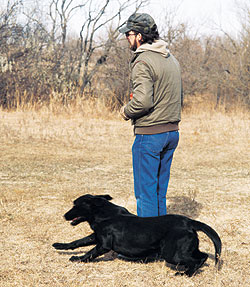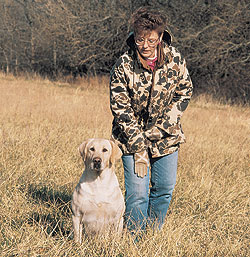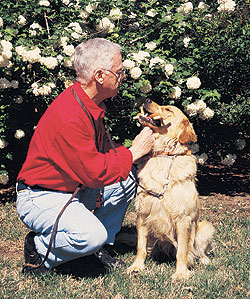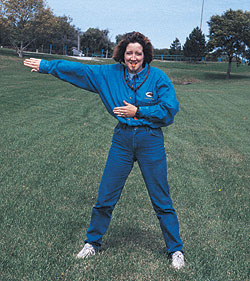Problems can be large or small, and you'll have to decide how soon they must be fixed.
By James B. Spencer
 Breaking can be anything from a show-stopper to a ho-hummer, depending on when it happens and how you feel about it. |
The smart money is betting that before this hunting season is over, you (as "Every-Hunter") will find yourself in a dilemma about how to deal with a training problem your dog (as "Every-Retriever") will present you with. Should you ignore it? Should you mix a little training in with your hunting right away? Should you wait until after hunting season to cure it? Or should you stop hunting your dog while you cure the problem?
If you're looking for pat generic answers, you won't look long before you discover that they don't exist. To some degree, each training problem that comes up while hunting is its own puzzlement, its own predicament.
How They Happen
Unfortunately, no retriever bright enough to know the difference between Fetch and Give would ever mistake hunting for training. From the canine point of view, several significant differences are glaringly obvious: the weather, the location, the crate time, the level of activity, and most of all, the boss' attitude and general deportment.
"In training," Every-Retriever muses, "the boss focuses almost entirely on moi, and he does everything so consistently and precisely. But while hunting, he hardly notices me, and he vacillates between semi-consciousness and wild excitement. Hmmm, if the rules are different for him, they must also be different for me."
Thus does Every-Retriever begin taking liberties while hunting. And Every-Hunter, in his mental ecstasy, at first fails to notice anything different, then overlooks it for a while, but finally begins to get upset. Then he must decide in which of the four above named ways he should deal with the problem.
Which he should choose depends on several factors: his own values, his retriever's age and temperament, and the nature of the problem. Let's look at these one at a time.
Your Values
If you're a dedicated field trialer or hunt tester, you shouldn't let your retriever get away with anything while hunting that he couldn't get away with under judgment. Period. Case closed. This means that, even while hunting, you'll be more focused on training than on shooting birds. Ideally, you should have a buddy along to do most of the shooting.
Some serious dog-gamers keep a second retriever, frequently an old "retiree," around for more carefree hunting.
If you're a casual dog-gamer--I've never known one, but rumors of their existence persist--you'll have some judgment calls to make. If you're too demanding, hunting won't be much fun. If you're too lenient, your kindness will almost certainly come back to haunt you next spring in your dog-game of choice. You, too, could benefit from a second retriever, just for hunting.
If you have no dog-game ambitions, you only need to please yourself and your hunting buddies. So, except for a few very serious problems that must be addressed immediately (see below), you're free to deal with canine misbehaviors however you wish.
If your retriever errs in ways that neither upset you nor spoil the hunt for anyone else, you can ignore it, or perhaps put the correction off until after hunting season. If he does something that particularly offends your sense of proper canine deportment, even though others may think it trivial, you're free to stop the show and correct him immediately.
 Creeping just a little is a ho-hummer for most of us. |
Your Dog's Age and Temperament
In general, you should be especially demanding during a young retriever's first couple of seasons. He's forming lifetime habits, and you should "guide" him toward habits that are consistent with your goals and good pleasure. On the other hand, if your retriever is an old campaigner enjoying what may be his last season afield, you should relax and give him his head. He's earned the right to thumb his nose at you now and then. In future years, you'll cherish the memories of his sometimes puppy-like misdeeds during these last few hunts.
Your dog's temperament is another significant factor. Some retrievers are soft and sensitive. Others are tough and determined. Most fall somewhere between those extremes.
If yours is a tough animal, you should cure every problem you feel worth curing as quickly as possible. Otherwise, you'll probably never completely cure it. On the other hand, if your dog is soft and compliant, you can put off correcting many problems until after hunting season without risking long-term repercussions.
If your dog's temperament is somewhere between these extremes, you'll have to use your own judgment in determining what must be addressed immediately and what can be put off.
The Nature of the Problem
Some problems are so serious and so quick-setting that, if you don't stop everything and cure them immediately, your dog will very soon become worthless to you as a hunting partner. Let's call such problems "show-stoppers." Others are so trivial that curing them is purely optional for all but serious dog-gamers. Let's call these "ho-hummers." Most fall somewhere between these extremes. Let's call these "agitators." No one could list all the problems that fall into each of these three categories, so I'll just list a few of the more common ones.
The show-stoppers are relatively rare (Deo gratias) among retrievers. One example is hard-mouth. This is so serious that, when your dog seriously damages his first bird, you s
hould stop hunting him immediately and cure the problem with all due haste. If you don't know how, at this point, you don't have time to learn, so hasten to a competent retriever pro and have him do it. If you'd like to know how to cure hard-mouth for future use, you'll find everything you need to know in my book, Retriever Training Drills for Marking, which is available from the Gun Dog Bookshelf.
Gun-shyness is another show-stopper. This is extremely rare among retrievers trained in the conventional way because the bird throwers normally shoot before throwing, so the dog learns to associate gunfire with an impending retrieve. But it does happen and requires immediate attention lest it become permanent.
Here too you should stop hunting your dog until he is cured. If you don't know how to deal with this problem, you should turn the job over to a competent pro.
Another show-stopper is "stickiness," or freezing on a bird. This is not related to hard-mouth. A sticky dog normally doesn't damage birds and a hard-mouthed dog normally doesn't refuse to release them on command. Stickiness is a quick-setting problem, so should be cured as soon as it appears.
 The cure for the various mouth problems discussed here is based on force-breaking. |
Granted, you can get a sticky dog to release a bird by blowing hard into his nostrils or ears, or by touching his groin area near the upper thigh. But those are merely stop-gap measures. Stickiness is a complex problem, perhaps too complex for the average amateur owner to deal with, so here too you should seek the assistance of a pro trainer.
Two other show-stoppers: breaking or vocalizing as birds approach. Either will frighten incoming birds away.
Examples of the "agitator" problems are breaking after the shot; creeping; vocalizing after the birds are shot; and sloppy responses to commands. You can easily work on these while hunting, and in their more serious forms, you should do exactly that. In their minor forms, if you wish, you can let them go until after the end of hunting season.
Examples of "ho-hummers" are: sloppy-mouth retrieving, in which the dog frequently drops the bird and picks it back up again as he brings it to you; poor initial lines to blind retrieves; and not carrying casts an appropriate distance before veering off.
Physician, Heal Thyself
So much for dealing with your retriever's errant ways. Now it's time for you to examine your own deportment relative to his mistakes.
 Examine your own habits. Do you give casts in the same way while hunting as you do while training? |
If he breaks, does he do it because you broke first? After shooting a bird while hunting, do you act just as you do on marked retrieves during training sessions? Or do you jump up and move forward as the bird falls?
If he sticks on a bird, is it because you have been roughly snatching birds from his mouth instead of guiding him to back off and leave the bird in your hand?
If he refuses your casts, are you giving them the same way and in the same tempo you use in training sessions? Or, in your excitement, do you wave your arms around like you've gone berserk?
In short, if you expect your retriever to behave in hunting as he does in training, you have to behave in hunting as you do in training. And that jest ain't no easy task for anyone.
Jim Spencer's books can be ordered from the Gun Dog Bookshelf: Training Retrievers for Marshes & Meadows; Retriever Training Tests; Retriever Training Drills for Marking; Retriever Training Drills for Blind Retrieves; Retriever Hunt Tests; HUP! Training Flushing Spaniels the American Way; and POINT! Training the All-Seasons Bird Dog.






